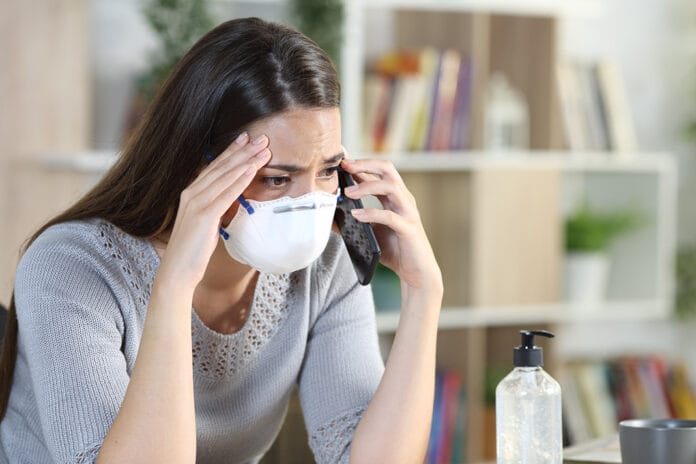A year ago, I had a patient who experienced a panic attack, and everything I learned in hygiene school went out the window. My mind went completely blank, and I ran out to get help. I gave her bottled water and stayed by her side while the dentist asked her to take deep breaths and think of her happy place.
Looking back, I remember asking myself, “What were the triggers?” I wonder how she must have felt.
We were all bombarded with mass information this past year. The news channels and social media platforms made it impossible to know what information was reliable. COVID-19 has been a major issue and has brought a sense of uncertainty to our lives. For the first time in my life, I now know how it feels to be anxious and afraid.
Let Us Talk Anxiety
Have you ever felt like the world is crashing down on you, and you are absolutely doomed? From March until July during 2020, I was eating, breathing, and sleeping COVID-19 thoughts. I was hesitant about providing care and afraid for my husband who was working in the pharmacy department at our local hospital. Everywhere I would look, whether it was the television news, my social media accounts, my family, and coworkers all expressed stress in one way or another. Many of us had no choice but to get back in the dental field and are taking necessary precautions to prevent the spread.
Anxiety is the mind and body’s reaction to stressful, dangerous, or unfamiliar situations.2
Some of our patients have indirectly expressed their fear by saying things like “Did you wash your hands?” or “Can I keep my mask on?”
From my point of view, it was a bit frustrating and difficult to just laugh off. I had to remind myself that I am not the only one feeling stressed and concerned. We can even see it orally − through bruxism and increased periodontal disease.
According to a poll done by the Health Policy Institute from March to September 2020, dentists reported increases in the prevalence of bruxism (59.4%), chipped and cracked teeth (53.4%), and temporomandibular disorder symptoms (53.4%) among their patients.1 More than a quarter saw a rise in other conditions, including 26.4% who reported an increase in caries and 29.7% who reported an increase in periodontal disease.1 The survey further breaks down the percentages by age group.
Many patients have shared their distress with me, and the most I could offer was a listening ear. I found myself dwelling in negative reflections. After my patient would leave, I would replay the entire conversation and tell myself what I should have said. That sort of mental pressure is unhealthy.
Although I am not a professional mental health advisor, I wanted to share some insights that have helped patients and me cope with anxiety.
1) Encourage professional help. People are hurting more than ever. It is important to be empathetic toward the people we interact with. Sometimes patients overshare, and just listening without judgment is a stepping stone. Although we are not mental health experts, we should be aware of available resources such as support groups and professional counseling so we can give the necessary referrals.
2) Ask your patient what is making them anxious. With time restrictions, you may not be able to ease into the appointment as planned. However, it is moments like these that help build trust. Consider the outcome of future positive appointments.
3) Breathing and grounding techniques. If you or your patient is feeling anxious, use the 5-4-3-2-1 exercise. Have them look around the room and list five things they can see, four things they can feel, three things they can hear, two things they can smell, and one thing they can taste.3 This technique is simple to remember and follow. It helps shift the focus to surroundings and decreases the mind from bouncing between thoughts.
These suggestions could help health professionals in these difficult times.
1) Journaling. This is not something we can recommend to our patients; however, it can help us process our emotions. Sometimes it can be challenging to verbalize how we are feeling on the inside. Writing down your feelings can help organize your thoughts. I like to write down three things I am grateful for every day.
2) It is important to unplug. Some of us work at multiple offices or have side jobs. Your mind and body need to recover from your workday. Unplugging will help us sleep better, reduce anxiety, and remind us to live in the moment.
3) Take care of yourself. In a field where we put our patients’ needs first, we must remember that you need to look after your own mental health too. Our thoughts and beliefs influence our perception and experience of ourselves. Every morning, I say 10-15 positive affirmation statements to myself. This kind of therapy helps strengthen self-esteem and remove self-doubt.4 My favorite affirmation is, “I am confident in my talents, strengths, and abilities.”
Whether we like it or not, this pandemic and quarantine have heightened our fear of the unknown – the lack of trust, loss of a loved one, and growing disparities. Let us focus more on taking care of ourselves and staying positive through these unexpected times. As we start the new year, remember to take things one day at a time.
Now Listen to the Today’s RDH Dental Hygiene Podcast Below:
References
- Versaci, M.B. (2020, September 28). HPI poll: Dentists see increase in patients’ stress-related oral health conditions. Retrieved from https://www.ada.org/en/publications/ada-news/2020-archive/september/hpi-poll-dentists-see-increase-in-patients-stress-related-oral-health-conditions.
- Jovanovic, T. (n.d.). What Is Anxiety? org. Retrieved from https://www.anxiety.org/what-is-anxiety.
- Smith, S. (2018, April 10). 5-4-3-2-1 Coping Technique for Anxiety. University of Rochester Medical Center. Retrieved from https://www.urmc.rochester.edu/behavioral-health-partners/bhp-blog/april-2018/5-4-3-2-1-coping-technique-for-anxiety.aspx
- Staff, G. (2015, September 23). How 15 Positive Affirmations Can Change Your Life. Goodtherapy.org. Retrieved from https://www.goodtherapy.org/blog/how-15-positive-affirmations-can-change-your-life-0923157












